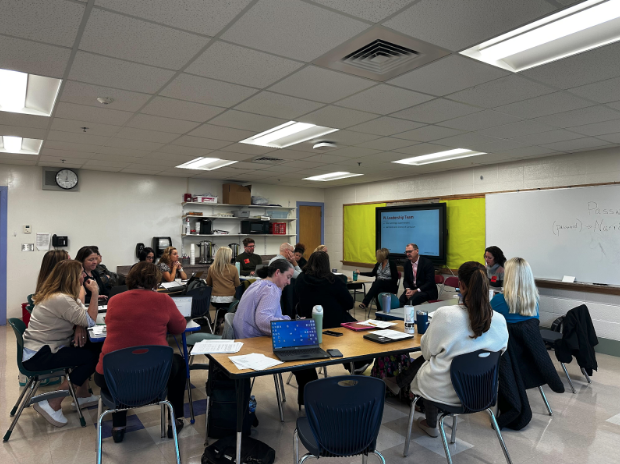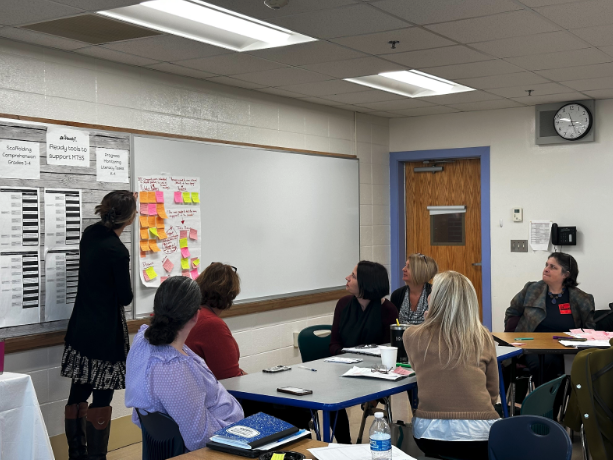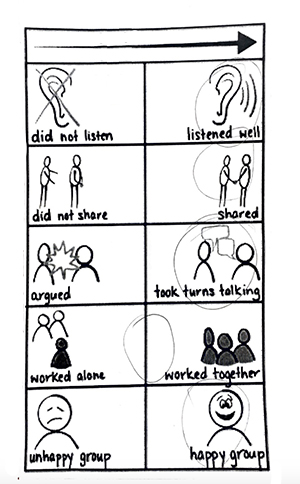The Rhode Island Professional Learning Network is a long-term collaboration that starts with planning evidence-based PL initiatives that are responsive to member districts' priorities and incorporate implementation, data collection, and connected learning in order to achieve the following goals:
- Improvement in schools
- Learning for educators
- Useful insights for others
The PL Network is a partnership between the Rhode Island School Superintendents Association and the Annenberg Institute and includes members from Bristol-Warren, Central Falls, Narragansett, Providence, Woonsocket, and Paul Cuffee charter school. Please contact Brenda Santos if you are interested in learning more about Annenberg’s work with Rhode Island schools.
Narragansett School System Hosts the First Deep Dive
On Wednesday, November 13, 2024, Narragansett School System hosted the first of five Professional Learning (PL) Network Deep Dives at Narragansett Elementary School. During Deep Dives, PL network members spend half of a school day learning together, by focusing on one district’s initiative, observing instruction and teacher PD, and offering their expertise as critical consultants to each other. Thank you to network members Gail Dandurand and Pete Cummings, NES principal Lisa Wilson, and the entire team in Narragansett for welcoming us!

What We Learned
- For Narragansett coaches, leading change started with making change in their own classrooms. As their work continued, classroom implementation remained the key to bringing more teachers on board.
- Coaches Linda McQuaide, Jen Loiselle, and Vanessa Miller adopted Building Thinking Classrooms (BTC) in their own teaching (Linda in middle school math, Jen in high school reading intervention, and Vanessa in high school digital literacy) so that they could bring teachers first hand experience with implementation.
- Narragansett leaders eagerly encouraged early adoption. When teachers expressed interest, they piled on the support. And then they took every opportunity to shine a light on changing practice, changing attitudes, positive student feedback, and academic results!
- To help every teacher get on board, leaders looked for ways to make BTC adoption accessible, like encouraging teachers to try it for short “non-curricular tasks.”
- For Narragansett, Common Planning Time (CPT) was a necessary condition for success. District leaders prioritized making sure every teacher has common planning time with their team.
- Coaches in Narragansett coach by team. As teachers support one another and see BTC working with students in their grade level or content area, momentum builds!
- Shifting teacher practice in NSS has meant putting HQCM and the district’s pedagogical vision for active and engaging classrooms “in sync.” During CPT, coaches support teachers as they plan to implement curriculum using BTC strategies for developing student thinking and ownership over their learning.

Practical Measures in Action
Narragansett High School teachers implementing BTC created a rubric for their students to reflect on their engagement in collaborative learning. The elementary team then iterated on the tool (below), which we saw in action in NES classrooms!

In classroom observations, we saw how supports for collaborative learning like this tool above help students develop the social learning skills they will need in school and life, the cognitive skills of independent learners (as they work together to define problems and design approaches to solving them), and the reasoning skills of mathematicians.
What Leaders Are Saying
Deep Dive participants returned to their districts across the state with concrete resources and next steps for their own PL leadership.
“Narragansett provides a road map: we can begin with the book study invitation, follow up with job embedded coaching and team collaboration. Protocols for student collaboration are important to the system and so researching protocols with high-impact is an important step. Finally, supporting teachers with question sets that promote thinking is another important step/component to share, model, and investigate.”
“The more complex (more rigorous) the task, the higher the student engagement and mathematical discourse. I will bring this back to my district so that we may ensure that we are providing students with rigorous tasks that promote productive struggle that lends itself to more engagement and discourse from the students.”
The next PL Deep Dive will be happening in Woonsocket on December 11th. Please contact Brenda Santos ([email protected]) if you are interested in learning more about Annenberg’s work with Rhode Island schools.